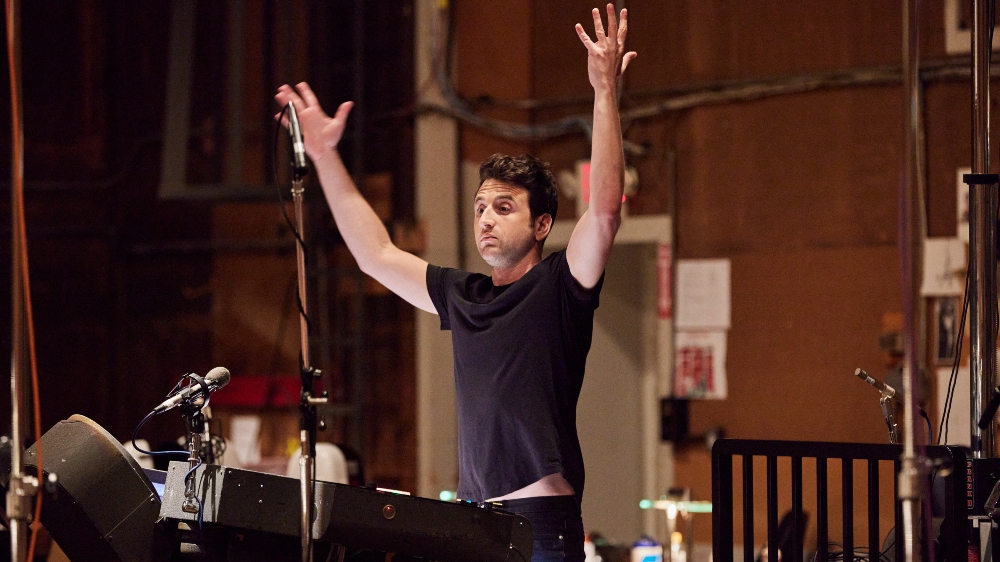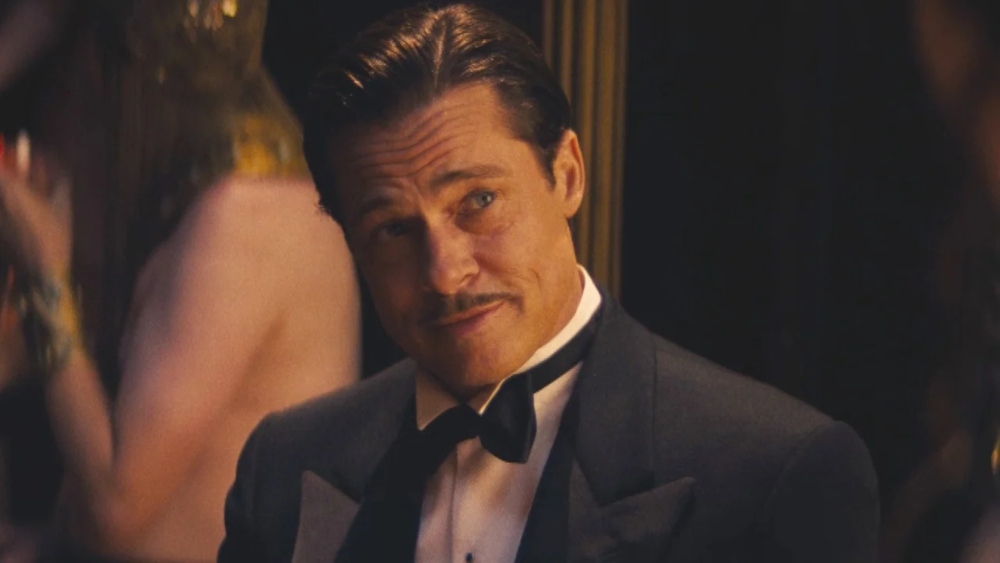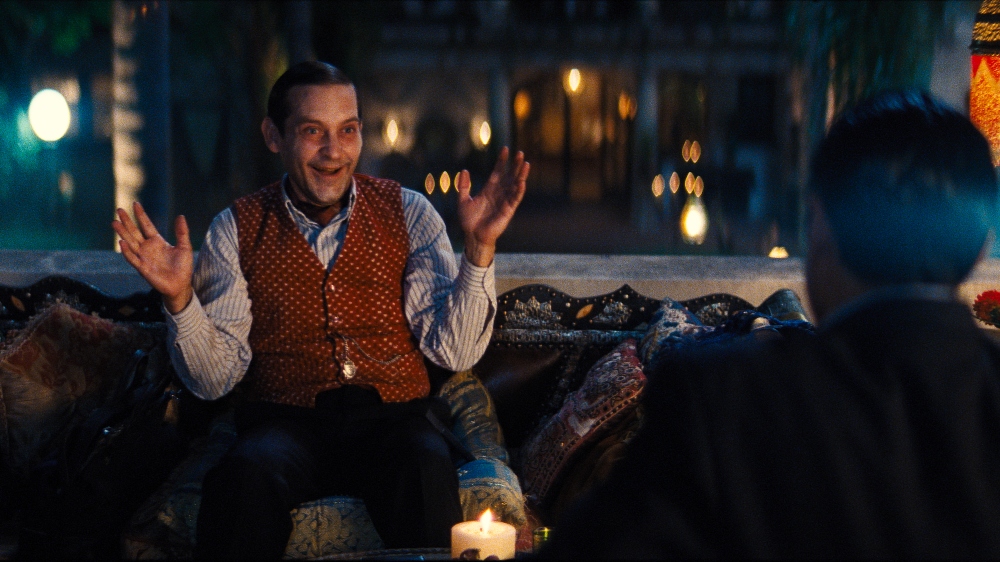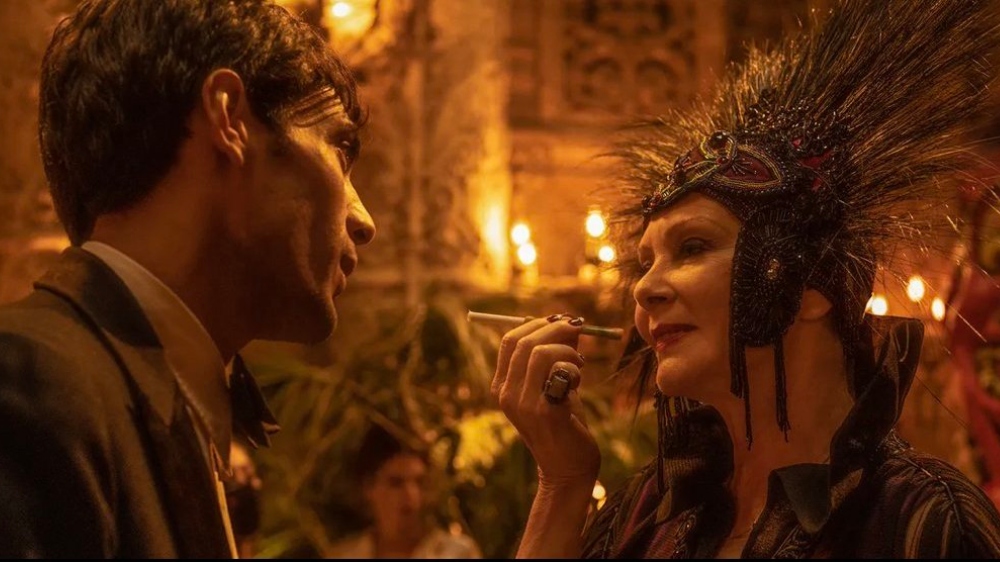Writer-director Damien Chazelle has been working on Babylon for more than a decade — that’s how long the movie has been living in his head. Oscar-winning composer Justin Hurwitz hasn’t lived with the project for quite as long, but he worked on the score for three years, and while his scores for Chazelle’s previous films run just over an hour, his Babylon score clocks in at around two hours, which is a considerable amount of music for a three-hour-plus film.
Featuring a star-studded cast led by Margot Robbie, Brad Pitt and newcomer Diego Calva, Chazelle’s latest film is an old-school Hollywood epic, a tale of outsized ambition and outrageous excess that traces the rise and fall of multiple characters during the golden age of Tinseltown — an era of unbridled decadence and depravity. Much like Singin’ in the Rain, the film starts out during the silent film era before transitioning over to the days of talkies, when Warner Bros. changed the game by introducing sound in The Jazz Singer
Below the Line recently spoke to Hurwitz, who discussed the evolution in his working relationship with Chazelle, the direction and notes he received from the director as he worked on the score for Babylon, and some of the challenges that came with the pandemic. Two previous tracks, “Voodoo Mama” and “Call Me Manny” were previously released, but Hurwitz also discusses another favorite track, “Damascus Thump,” and how it fits into the film.

Below the Line: Babylon marks your newest collaboration with filmmaker Damien Chazelle. How has the shorthand improved in your working relationship since rooming together in college?
Justin Hurwitz: Well, so much of how we get our work done is the same, like kind of remarkably the same. The way that I do piano demos right here and email them off. We go back and forth a lot by email and text. Certain things have changed in terms of, like, the office situation. That’s new. I suppose we had dorm rooms next to each other. We did not do that actually on Whiplash. So Whiplash, I was here; he was off cutting with [Editor] Tom [Cross] at Blumhouse.
La La Land was the first time that we decided to get offices next to each other during all of post-production and that changed everything for us to have that kind of access to each other all day [and] all night if we work late, which is often. My room and the editing room share doors [with] each other. I’m going into the editing room, he’s coming into my office all day, back and forth, picture and music, music and picture. That was a really big evolution and how we got stuff done in post and we still do that. We had offices together for almost a year on Babylon. It’s not just the work between me and Damien, too. It’s between everybody. I see Tom, I see the assistant editors, I see the apprentice editor. We’re all bumping into each other and exchanging information. It’s a really great way to work.
BTL: I saw the film last week and found it to be a love letter to the cinema of the 1920s and ’30s. What was your starting point when it came to composing the score?
Hurwitz: I got the script in the fall of 2019. Damien and I just started marking it up and trying to identify where there would be music, which is a lot of places in this movie. The obvious places were the performances — the Sidney character, played by Jovan [Adepo], who plays trumpet, so those were pretty clear. I needed to understand where that music would then be used elsewhere. Of course, there would be score later… I just have to watch the movie and write it to the picture.
But when it came to those pre-recorded tracks, those tracks we had to create for the trumpet and for other performances, I figured out pretty quickly that music was also going to spill over into montages or was going to score other sequences. I needed to understand that structure.
I was like, ‘Okay, I understand we’re at the party here. But then this next part, are we still hearing that music? What’s carrying us through that next part?’ We needed to kind of structure all of that, so I was just asking a lot of questions. I was watching whatever storyboards Damien had created at that point, trying to understand where the music would fit in so that I could start writing it, arranging it, and structuring it to what the movie would be.
BTL: What sort of research did you do as you worked on the score?
Hurwitz: None. Damien did a ton of research on this movie. He’d been researching this movie for years. I really didn’t want to sound like [the] ’20s. Neither did Damien. We wanted to really stay away from ’20s Jazz. He had researched the music scene [and] what was going on. He told me a little bit about what was going on. One of the things he told me that was interesting was that the music that we’ve heard in movies and that we think of as ’20s Jazz is just a sliver of what was really being played at the time. There was a whole underground music scene — there was a whole more interesting music scene. It was just a very small subset of it that got to record.
We had fun imagining what the music could have been like that didn’t survive, that wasn’t recorded. How unhinged and wild could it be at these drug-fueled parties? What could they have been playing? What we did was probably not… I’m sure we cheated stuff more modern than what they were actually playing, but they could have done some of the things we were doing. The movie’s very aggressive, unhinged, [even] manic at times, and we wanted to just really go for it with the music in a way that is not what we’re used to hearing with the ’20s.
I guess I was researching in the sense [that] I was listening to stuff. I just wasn’t listening to ’20s stuff. I was listening to rock and roll, trying to get inspired by rock and roll riffs, the sort of things that could be on a distorted guitar. But we thought ‘okay, what if we use Unison horns? What if we just have a whole horn section play those riffs?’ Again, not really what ’20s music is, but [what it] could have been. Dance music, modern dance music, modern house, modern EDM, getting inspired by the sort of dance high hats and pounding kick drum 808 stuff, and the risers and drops and moments of building anticipation and delivering and getting people wanting to move — those sorts of moments and structures, I was thinking a lot about that stuff when I was writing this music.

BTL: Did Damien give you any particular direction or notes?
Hurwitz: Yeah, all the time. He’s the most hands-on specific filmmaker, I’m sure, [that] could possibly exist. It just depends on the phase. Early on, [we] just kept trying to come up with the sound of so many of the tracks in this. He wanted to really be kind of exotic, aggressive, wild. Those were a lot of the kinds of words he was using. Later on, when we got to scoring parts of the movie, like the Manny [Calva] and Nellie [Robbie] relationship, we wanted bittersweet. We wanted to bring in some circuit sounds. We want this kind of broken piano, carnival sound at times, which felt appropriate for their relationship. Every step of the way, he’s got direction. He has such a specific tone. You could tell watching this movie, everything visually — every craft, from visual to sonic, he has a very specific tone in mind. He’s created something of a very unique concoction for this movie and so he wanted to find, and we wanted to find, an equally specific and unique concoction for the music.
BTL: I love how it goes from the scenes of Singin’ in the Rain on the big screen to the future of what cinema turned out to be and is still becoming, in some ways.
Hurwitz: Yeah, it was a fun sequence. By the way, that was never how the movie was originally designed to end. It was supposed to end just with the Singin’ in the Rain piece and ends with Manny… the music carries us into the credits. But then, Damien had this big idea at the very end to create this whole new sequence that would really land the part of some bigger theme, which is one of the main themes of this movie and kind of where the movie ends up. This whole taking us through — I don’t want to give away too much of what the sequence is, but people will see this big, big ambitious sequence that lands the [idea] of some bigger concept.
BTL: Was this the longest time that you’ve worked on a score for any of Damien’s films?
Hurwitz: I worked on this for about three years, maybe a little longer. Yes, that’s longer than First Man, longer than Whiplash, for sure. La La Land, it’s hard to judge because we had so many phases. We developed it for a year in 2011 and then the project was dead. We made Whiplash first and then we came back [to La La Land] from 2014 to 2016, so that was another two years. It was about the same. It was about three years on that project. It’s [been] about three years on this project. The volume of music is a lot larger on this movie. This has a little over two hours of original music in it and La La Land had about one hour. The amount of music — this was by far the most we’ve done.
BTL: Is it a relief to know that audiences will finally be able to hear the soundtrack after so many years of hard work?
Hurwitz: I’m excited. [The soundtrack is] out and I’m excited. We’ve released two tracks, but there’s just a little sliver. There’s so much in this. There are a lot more tracks like that, just fun and aggressive [that] make you want to dance, hopefully. There are some really sort of gentle and sweet cues, like I mentioned, for the Manny-Nellie story, there’s some circus music, there’s some erhu music for that Chinese boat instrument.
We had a lot of fun taking… and we’ve done this before — we did this for La La Land — when you have a set of themes and melodies and tunes that you like, we have fun taking them and twisting them and using them in other ways, disguising them [and] using them all over the score. I’ve taken some of the tunes that we use early on and I’ve twisted them. I’ve turned them into a Greek sort of thing later [during] this set piece where you meet the Tobey Maguire character.
There’s a Hawaiian Tango that comes right after that, [which] calls back a melody from earlier. Almost every cue, except for one or two, comes back to a set of 6-8 themes and bars, then twists them [and] reuses them for whatever that scene needed to be. I hope people see those connections and connect some of the dots when they hear the whole soundtrack and then see the movie and how it all fits together.

BTL: Do you have a favorite track on the soundtrack or is it too hard to single one of them out?
Hurwitz: It’s hard. I really liked the ones we released, “Voodoo Mama” and “Call Me Manny.” I think those are really fun. I guess my other favorite is called “Damascus Thump.” It’s this very aggressive, abrasive driving thing. It scores this part of the movie where Sidney [Adepo] is playing on this movie set, having to do this very humiliating thing that people will see when they see the movie. Part of it is getting at his anger but we also use that music… we cut away, and we use it for this whole section of the movie where Jack is speeding down the highway to go confront Irving Thalberg [Max Minghella] about something and Manny’s marching down the hallway trying to find Nellie and a lot of stuff is going on. The movie is getting really, really intense and this driving piece of music carries us through it. It’s not really jazz. Some people might call it jazz, but I don’t think it’s really jazz. It’s kind of this weird thing with this weird tone. Very aggressive, like I said, and [featuring an] awesome trumpet part played by this guy, Sean Jones, who came from Baltimore.
I went searching, like, all over the place for the right musicians for this. I wanted to really cast the musicians very carefully. It took three incredible trumpeters coming from all over: Sean Jones from Baltimore, Dante Winslow from L.A., [and] Ludovic Louis from Paris. All three of them, together — because they all have very different abilities and talents — were the sound of the trumpet across this movie. A couple of amazing sax players: Jacob Scesney in L.A. and this guy Leo Pellegrino — Leo P — who plays all of the kind of dance baritone sax that you hear in “Call Me Manny.” Anyway, I went off track, but Sean Jones played this really, really fiery trumpet part in “Damascus Thump” that I think is really awesome.
BTL: I know exactly the sequence you were talking about.
Hurwitz: Yeah.
BTL: Did the pandemic add any challenges when it came to recording the score?
Hurwitz: For sure. Well, first of all, the pandemic delayed the whole movie by a year, almost to the day. That was kind of a blessing in disguise because it gave us time to continue working on the music. This has happened to us before. We were set to shoot La La Land at one point, and then the plug got pulled. It was delayed and it was very heartbreaking at the time but we got all this extra time. It gave us time to rethink things, to basically step back and say, ‘Okay, what do we have? We had all these things that we thought were great, [but] which ones are actually great, and which ones can we do better?’
We did the same thing on Babylon, where we had all of this music worked out, but we had this whole extra year. So we said, ‘Alright, what do we love and what do we think is okay, but we could probably beat?’ In that year, we continued to develop the music and threw some things out, restarted. That was probably a good thing. It was frustrating, but it was a good thing.
When it came to actually recording the music with the Covid stuff, that was a pain in the ass. When you have COVID compliance officers come in with measuring tapes and being like, the chairs need to be 12 feet away, but the county’s rules [were one thing] and you had all these conflicting rules — the county said they have to be six feet away and the recording studio said they have to be 12 feet away and the studio said they have to be nine feet away. All these rules were developed by corporate lawyers instead of actual doctors and it was just very confusing and very hard.
Trying to balance the needs of the musicians — first of all, obviously, that matters first and foremost. People were tested by this point, people were vaccinated. [But] balancing those needs with what we needed to make the music sound good, we can’t put the seats 12 feet apart. It won’t work, they won’t blend. The microphones won’t capture it. Trying to have to get all that stuff was very annoying but we fought through it and I think the music sounds good. Everybody was safe, so here we are.

BTL: I know there are some composers that are very particular about where they record because of how the room sounds.
Hurwitz: Yeah, yeah, absolutely. We recorded a lot. We did the big orchestra stuff at Sony. We did a lot of the smaller stuff — the band, the small ensembles, the percussion, all that stuff — at Capitol. We did 2021 and 2022 at Capitol. I love that room. That room is incredible. Capitol A, Capitol B, we used both at different points, sometimes together. Capitol closed — Capitol has been renovating for three years or something, so we had to go to other studios. We used United. We used a studio in Paris called Ferber. We used a studio in Pittsburgh for one of the musicians. We were recording all over, but very often, we were trying to chase that Capitol sound, which is just a beautiful room.
BTL: You’ve won two Oscars for your work on La La Land. How do you manage to stay grounded?
Hurwitz: [I] surround myself with people who criticize my music. That’s the best thing. I think where you get into trouble is where you start to think that everything you do is great and when the people around are like, ‘you did it again, good job!’ Good job… it’s almost like Damien’s… I love that line he wrote for Whiplash — “There are no two words in the English language more harmful than ‘good job.'”
I love notes. I never want to be insulated from notes. I want to go to the test screenings and listen to what all the people say, read all the comment cards, [and] make sure my collaborators are giving me the critical side of things, not just the part that they love. I mean, there’s no problem with Damien. He’ll always tell you what needs to be better. But when it comes to the rest of the circle, I always get very… I give stuff to my parents sometimes and they’re like, ‘we love it, sweetie, great job.’ I’m like, ‘don’t tell me what you love. I appreciate that but tell me what you didn’t love. Tell me what needs to be better because that’s what I need. That’s what will help me narrow in on what I need to work on.’ I think that’s important — continuing to get honest feedback from people and wanting honest feedback and not just wanting pats on the back.
BTL: Before we wrap up, I have to say that when I saw the landing sequence in First Man in Toronto, the score was just brilliant.
Hurwitz: Thank you. Thank you.
BTL: The film as a whole is an underrated masterpiece in my opinion.
Hurwitz: Yeah, yeah. Everything Damien makes is made at such a high level. I wish more people had seen that movie but we’re proud of the work.
Paramount Pictures will release Babylon in theaters on Dec. 23. The original motion picture soundtrack is now available to purchase wherever music is sold.





